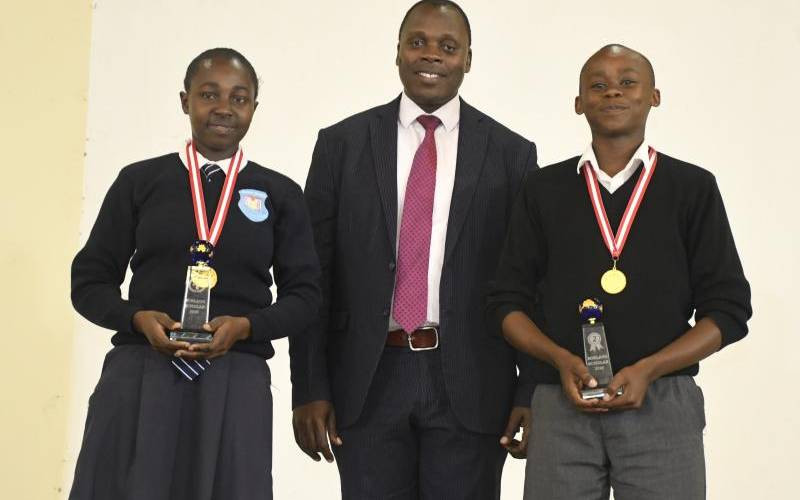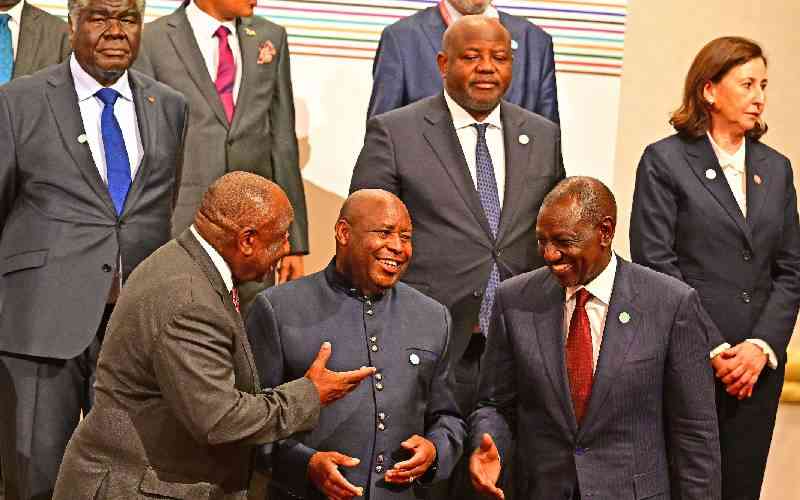
Even in her wildest dreams, Jael Achieng never imagine she would one day travel to Unites States of America, especially while in secondary school.
However, this October, Jael 18, a student at Loresho Secondary, Nairobi, along with Blessed Kyalo from AIC Tangu Comprehensive School in Makueni County, will represent Kenya at the Global Youth Institute in Iowa, USA.
Their innovative project on food security emerged the best at the Food Security Youth Conference held at Kalro in Nairobi.
“I am going to the USA. It’s a miracle,” Jael says joyfully, adding, “It wasn’t easy. It took us unwavering focus, countless hours of research and strong dedication, to stand out.”
In her five-minutes presentation, Jael focused on Bosnia and Herzegovina, illustrating how war devastated the country’s agricultural production, leading to widespread poverty and malnutrition.
She began, “Imagine waking up at dawn, and realize that your farm is gone, burned and buried under fire. Your grain fields, once golden with harvest, now lie hidden among landmines. This is the reality for thousands of families in Bosnia and Herzegovina…”
Although the war ended, the country still grapples with scars in public health sector with persistence in malnutrition, unequal access to clean water, healthcare, and cultural norms that continue to hinder many women from accessing proper nutrition and education.
As potential solutions, Jael proposes establishment of community nutrition hubs that offers counselling and social classes to all, home gardening programs providing seed kits, tools, and training to smallholder farmers-especially in rural areas, and school feeding programs that offer nutritious meals to students.
“I am going to do my best and make my country proud in USA,” Jael who wants to pursue Law promises.
Jael is one of hundreds of students who participated in a program organized by the World Food Prize Foundation, that engages, trains and empowers students on climate change, food security and innovations that address food security.
Dr Kenneth Monjero, the Coordinator for the World Food Prize Foundation, Kenya Youth Institute Program, at Kalro explains,
“We have engaged learners in discussions to help them understand the principles of design thinking, how to co-create, identify problems, develop innovations and collaboratively arrive at creative solutions that address food security.”
They engaged 130 schools-both public and private at all levels, including nationals, sub-county and extra-county schools.
On his part, Kyalo, 15, chose Ethiopia, focusing on enhancing food security and healthy diet through water harvesting and cover crop.
Stay informed. Subscribe to our newsletter
“During my research, l discovered major challenge Ethiopia faces is unreliable rainfall, which significantly contributes to food insecurity, deeply affecting the local population,” Kyalo explains.
Recognizing the impact of climate-related changes, his solutions proposed the use of a sustainable water harvesting systems that could help the communities better manage and store water for agricultural use.
“Traveling outside Kenya had never crossed my mind. But, now l am headed to USA. It’s a rare opportunity and l am very excited,” he says.
The two students, recall their teachers approaching them with a project on food security, encouraging them to participate and conduct in-depth research.
The program began last year with a workshop for teachers, where they were trained on how to conduct research and understand the research process. The teachers then passed the knowledge to their students, guiding them on how to carry out original research rather than simply copying existing work.
Denis Muendo, a teacher at AIC Tangu Comprehensive School, says he was trained to guide students through the global challenge.
“After training, l implemented the program at our school by giving students the instructions provided. They carried out their own research, drafted their work and collaborated to refine their submission,” Muendo explains.
Muendo began with a group of 15 students who collectively chose Kyalo to represent them at the various stages of the competition.
“Although these students are in Kenya, we encourage them to adopt a global perspective, since the world has become a global village, what affects Kenya can also impact other countries. We are engaging them to understand that food security is a global issue. They research different countries around the world, study their food security challenges, and develop innovations that address those issues,” Dr Monjero explains.
The two winners were selected by a panel of 18 judges, comprising of scientists and researchers. In Iowa State, Dr Monjero, popularly known as Dr Fun, says Jael and Kyalo will join over 3,000 students from more than 50 countries at the competition.
Dr Eliud Kireger, Director General at KALRO emphasizes the importance of equipping learners with knowledge, platforms, and mentorship to drive climate-smart, technology-driven, and sustainable agriculture.
“The youth are not just beneficiaries of food systems-they are innovators, influencers, and decision-makers. Their presentations highlight real, thoughtful issues and solutions to the food security issues globally,” Dr Kireger explains.
He affirmed, Kenya Youth Institute program, at Kalro is committed to nurturing young minds, promoting agricultural education, and bridging the gap between research and youth-led innovation.
Jon Wogman, Director of Global Youth Programs and Partnerships at the World Food Prize Foundation emphasizes that young people are critical to addressing global food security challenges.
“If we are going to make real progress in food security and agriculture, we must train the next generation of farmers, educators, scientists and researchers,” he says.
He notes, Food Prize Foundation has been working with youths for over 30 years, providing them with early exposure to pathways where they can make a real impact on agriculture and food systems.
Wogman explains, “By writing these research papers, students are not only learning about global food insecurity, but also building valuable skills in writing, research, analysis and public speaking.”
He highlights the importance of bridging the gap between experienced scientists and the younger generation.
Dr Jan Low, an Agricultural Economist, and the 2016 World Food Prize co-laureate, says
the world is facing unprecedented crisis across the food system.
“And because of that connection to the World Food Prize, I'm very committed to seeing youth become more engaged in agriculture and all aspects of tackling the food system,” she says.
Dr Monjero says, last year the program engaged only 15 schools within Nairobi County. Looking ahead, he promises to engage special schools in next year’s edition, with the aim to tap into innovative potential of learners with special needs.
Wogman says, each year, the organization maintains partnerships with schools around the world, including Kenya, Uganda, Honduras, Sweden, Netherlands and Sierra Leone.
Ultimately, he explains, the goal is for students to gain a deeper understanding of global food security challenges, and to live with the confidence that they can be part of the solution.
